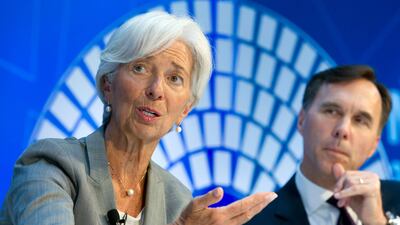Global leaders should undertake “a season of action” to help minimise any upset to global economic growth, the IMF’s managing director said.
Although global growth is much more broad-based — encompassing both advanced and emerging economies — it has yet to be complete and complacency should be averted, Christine Lagarde said in Washington DC taking place during the World Bank/IMF annual meeting.
“Far too many people across all types of economies are seeing their aspirations limited by the impact of technology and the repercussions of excessive income inequality,” Ms Lagarde said. “The result is growing tensions in many places and increased skepticism about the benefits of globalisation.”
Ms Lagarde’s cautioning words come days after the IMF upgraded its global growth forecast for this year to 3.6 per cent and 3.7 per next year, 0.1 percentage points higher than its July projection, with higher forecast for leading economies including the US, Japan, Europe and China.
Global economic growth is currently at its strongest since the 2007 financial crisis.
The pick-up in growth, compared to 3.2 per cent last year, is mainly thanks to higher investment, consumption and trade, she said.
Emerging markets, which led growth in the last few years, share it now more equitably with advanced economies.
“It is time to take those policy decisions that will actually enable more people and more countries to benefit from that recovery that should be made sustainable,” Ms Lagarde said.
But there are laggards.
“Last year, 47 countries experienced negative growth on a per capita basis, including many small and fragile economies,” Ms Lagarde said.
The IMF managing director is proposing a three-pronged approach to tackle the economic challenges that lie ahead: addressing fiscal policies, monetary policies and structural reforms.
Fiscal policies should be maintained in healthy economies which should invest in infrastructure, safety nets, education and greater participation of women in the labour force. Countries with high debt should try and lower their debt to GDP burden.
On the monetary policy front, leaders should be aware of the risk associated with easy finance conditions.
With regards to structural reforms, they should include reforms of the labor market and reform of access to the service markets.
She also said global action is needed to tackle climate change, fight corruption and adjust to the disruptive technologies such as fintech.
Ms Lagarde’s comments come as negotiations on the North American Free Trade Agreement (Nafta) kick off and ongoing negotiations over UK’s exit from the European Union continue to stall.
Ms Lagarde said Brexit and a US exit from Nafta, which US President Donald Trump has said was an option, cannot be put in the same bracket.
She welcomed the start of negotiations between the US, Canada and Mexico, saying trade pacts needed to be revisited in order to help re-facilitate trade and increase trade movement.
With regards to Brexit, Ms Lagarde said a no-deal is unimaginable and called for the resolution of the situation of people first, then businesses.
“I just cannot imagine that that would happen because I am - you know- for the people themselves, what does it mean?,” she said. “The Europeans who are based in the UK. The British who hare living and residing in the European Union. The WTO does not provide for such rules.”
She also called for “clarity on the timetable and better certainty on the three pillars” of the exit talks to help reduce the uncertainty surrounding the outcome of negotiations.
The EU’s three pillars include the divorce bill, citizens’ rights and the Irish border.

